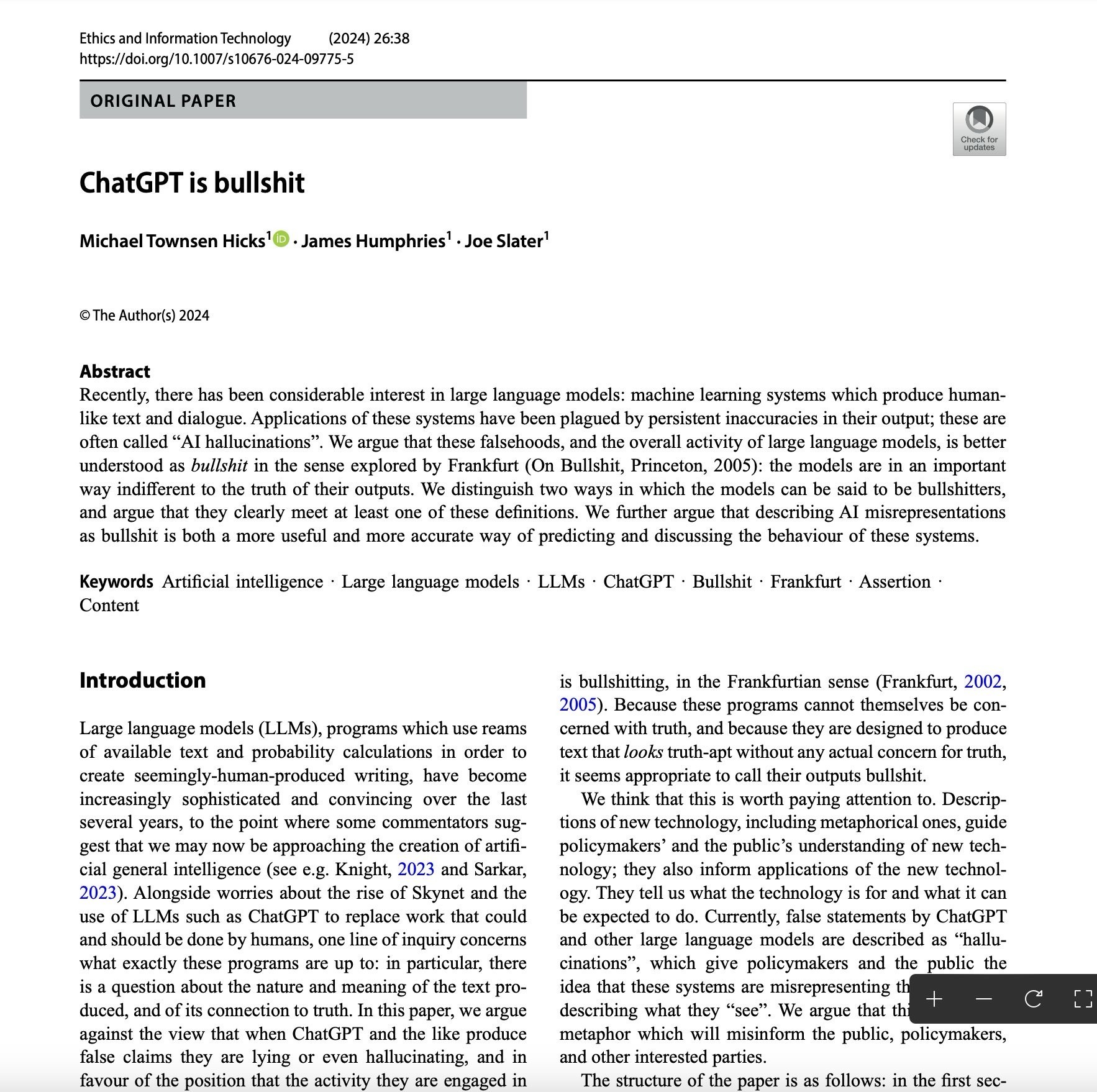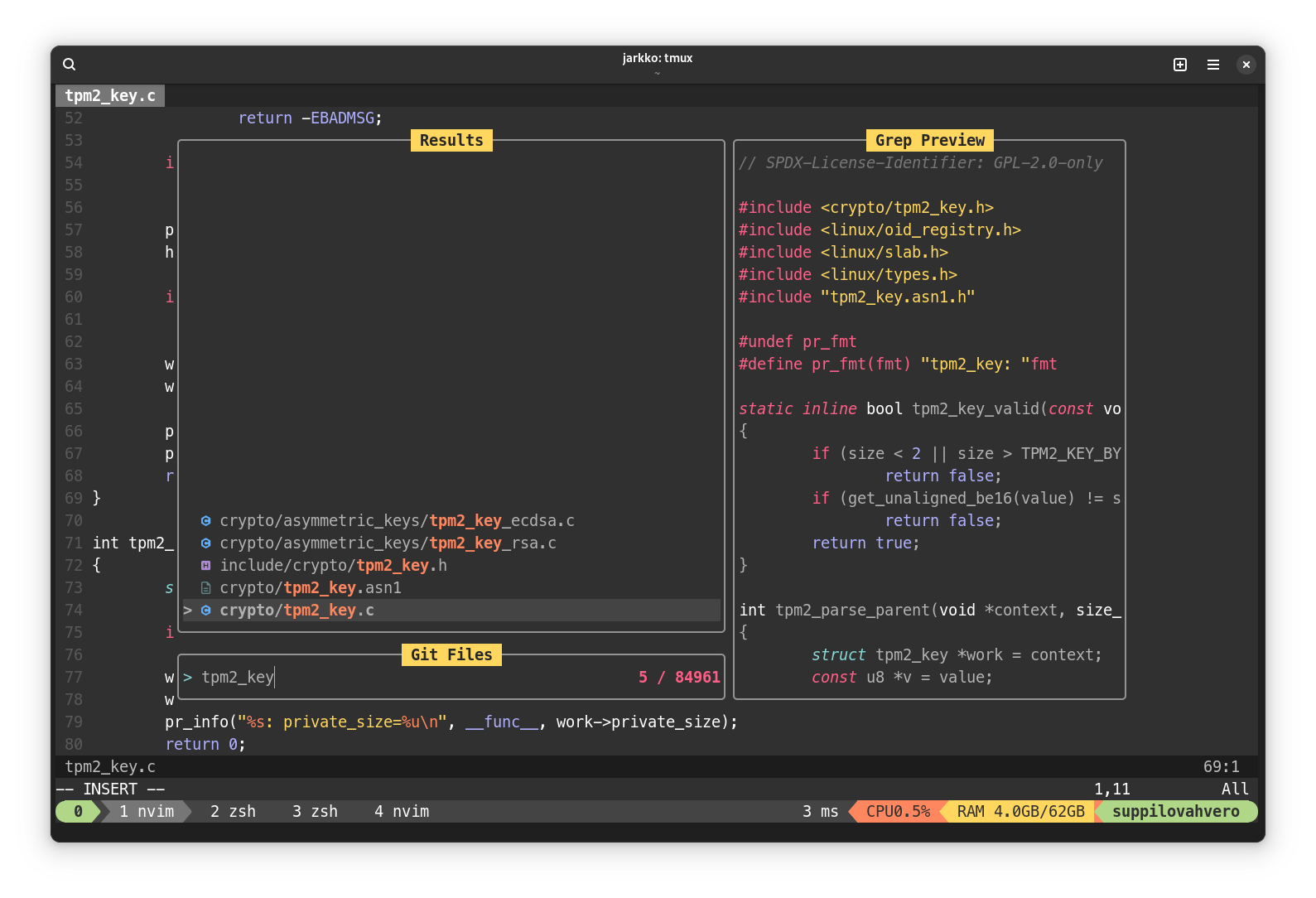Posts
4818Following
319Followers
489OpenPGP: 3AB05486C7752FE1
Jarkko Sakkinen
jarkkoTPM2 command encoding with #bincode and #serde:
let options = DefaultOptions::new()
.with_fixint_encoding()
.with_big_endian();
buf.extend(&options.serialize(&(Tag::NoSessions as u16)).unwrap());
buf.extend(&options.serialize(&22_u32).unwrap());
buf.extend(
&options
.serialize(&(CommandCode::GetCapability as u32))
.unwrap(),
);
buf.extend(&options.serialize(&(Capability::Handles as u32)).unwrap());
buf.extend(&options.serialize(&HR_PERSISTENT).unwrap());
buf.extend(&options.serialize(&1_u32).unwrap());
Jarkko Sakkinen
jarkkoThen editor and analyzer could have:
1. A better memory and caching strategy.
2. Both faster performance and lower operation latency.
#LSP is IMHO is exactly like the worst ideas of lrzsz modified to work as a language analyzer.
Fabio Alessandro "Fale" Locati
fale@fale.ioThe work on #bootc Is coming along very nice! This morning keynote by @cgwalters, Dan Walsh, and Stef Walter was very nice to see the current state of it in #Fedora and CentOS Stream. #devconf_cz
Jarkko Sakkinen
jarkko#neovim in #fedora 40 does this when opening a #lua file:
Error detected while processing BufReadPost Autocommands for "*":
Error executing lua callback: /usr/share/nvim/runtime/filetype.lua:35: Error executing lua: /usr/share/nvim/runtime/filetype.lua:36:
BufReadPost Autocommands for "*"..FileType Autocommands for "*"..function <SNR>1_LoadFTPlugin[20]..script /usr/share/nvim/runtime/f
tplugin/lua.lua: Vim(runtime):E5113: Error while calling lua chunk: /usr/share/nvim/runtime/lua/vim/treesitter/language.lua:107: no
parser for 'lua' language, see :help treesitter-parsers
stack traceback:
[C]: in function 'error'
/usr/share/nvim/runtime/lua/vim/treesitter/language.lua:107: in function 'add'
/usr/share/nvim/runtime/lua/vim/treesitter/languagetree.lua:111: in function 'new'
/usr/share/nvim/runtime/lua/vim/treesitter.lua:41: in function '_create_parser'
/usr/share/nvim/runtime/lua/vim/treesitter.lua:108: in function 'get_parser'
/usr/share/nvim/runtime/lua/vim/treesitter.lua:416: in function 'start'
/usr/share/nvim/runtime/ftplugin/lua.lua:2: in main chunk
[C]: in function 'nvim_cmd'
/usr/share/nvim/runtime/filetype.lua:36: in function </usr/share/nvim/runtime/filetype.lua:35>
[C]: in function 'nvim_buf_call'
/usr/share/nvim/runtime/filetype.lua:35: in function </usr/share/nvim/runtime/filetype.lua:10>
stack traceback:
[C]: in function 'nvim_cmd'
/usr/share/nvim/runtime/filetype.lua:36: in function </usr/share/nvim/runtime/filetype.lua:35>
[C]: in function 'nvim_buf_call'
/usr/share/nvim/runtime/filetype.lua:35: in function </usr/share/nvim/runtime/filetype.lua:10>
stack traceback:
[C]: in function 'nvim_buf_call'
/usr/share/nvim/runtime/filetype.lua:35: in function </usr/share/nvim/runtime/filetype.lua:10>
Press ENTER or type command to continue
Jarkko Sakkinen
jarkkoA crate for #TPM 2.0 library protocol, or beginnings of it: https://gitlab.com/jarkkojs/tpm2_library/
Sub-crates:
tpm2_callfor TPM 2.0 library protocol shenanigans.tpm2_clifor a command-line interfaces.
Development process:
I aim to do cli first as Linux tied but it could also have e.g. Windows backend. tpm2_call will be portable between operating systems.
Jarkko Sakkinen
jarkkoPS. I deleted 0.1.0 tag and release from pypi, because the tag was not signed ;-) you could never trust it...
Jarkko Sakkinen
jarkkoSo for my TPM2 crate I was thinking to rename the project Git as tpm2_library and have sub-crates tpm2_call for protoco and tpm2_cli with a sub-command tpm2cli rc.
Is it acceptable to name for consistency sake the sub-crate directory as tpm2_cli but generate an executable as tpm2cli?
Root project’s name inherits from https://trustedcomputinggroup.org/resource/tpm-library-specification/
Jarkko Sakkinen
jarkkoI initiated my own #TPM2 #Rust crate partly because the output given by tpm2_rc_decode does not give back the mnemonic of a return code.
Here’s the example from its man page:
tpm2_rc_decode 0x1d5
tpm:parameter(1):structure is the wrong size
So I wrote my return code decoder, and here’s how it works with the previous example:
target/debug/examples/tpm2rc 0x1d5
TPM_RC_SIZE
The Git-repository is available here: https://gitlab.com/jarkkojs/tpm2_call
I’m not going to add any code this crate dealing with /dev/tpm0. Instead the plan is to implement command buffer builder and parser with similar high-level ideas as I’ve done in the #Linux #kernel.
All Systems Go!
allsystemsgo@fosstodon.org📣 Only 2 days (today and tomorrow) left to get your talk proposals in for the All Systems Go! 2024 CFP.
The clock ⏲️ is ticking!
🏃♂️ Hurry over to get yours in: https://cfp.all-systems-go.io/all-systems-go-2024/cfp
Jarkko Sakkinen
jarkkoFor a non-web person like me it is easy to grasp. I got a page quickly created that I can send to the employers in the early Fall.
Another earlier mentioned tool, which has someone real innovation embedded is of course #Typst :-)
Making forks of old craft is mostly counter-productive and causes unnecessary drift and divergence, so I oppose all the Rust fork garbage.
It is morally legit to be in opposition against software that is developed from toxic standing point, considering open source community overall. Being toxic against toxic is not toxic.
#rustlang
Jarkko Sakkinen
jarkkohttps://jarkkojs.gitlab.io/
Jarkko Sakkinen
jarkkoI'll start with #ECDSA signature verification because that is secure without specialized hardware, and as of today #TCG is yet to support P256K1 in its #algorithm #registry.
Also this requires to implement the early version of Keccack-256 #hash algorithm because there are AFAIK padding differences with SHA-3.
#linux #kernel #keys #blockchain


